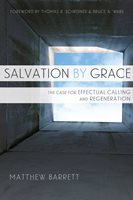In his Salvation By Grace: The Case for Effectual Calling and Regeneration Matthew Barrett provides a thorough discussion of this (as Warfield called it) “hinge of Calvinistic soteriology.” His work brings definitive clarity to the subject for all involved, and it demands a hearing from any who would take an opposing position.
Here’s how I (FGZ) tried to capture its significance in my endorsement:
Barrett’s examination of this critical area of theology is historically informed, providing an accurate setting and perspective for the discussion. It is also theologically precise, providing definitive expositions of all sides of the debate. It is surprisingly exhaustive, treating all the primary arguments and related responses responsibly. And, most importantly, it is exegetically compelling, bringing God’s own Word to bear on a doctrine designed to bring him glory. A valuable resource indeed! Highly recommended.
Matthew, Executive Editor at Credo Magazine is a good friend of Books At a Glance, and we’re glad to have him talk to us today about his work – and about this doctrine that demonstrates so compellingly that salvation is by grace.
 Books At a Glance (Fred Zaspel):
Books At a Glance (Fred Zaspel):
First, what is your thesis in this book? Can you summarize for us the doctrine you are seeking to expound and defend? And while you’re at it, perhaps you could explain the terms “synergism” and “monergism.”
Barrett:
Salvation by Grace argues that in Scripture God’s saving grace is monergistic—meaning that God acts alone to effectually call and monergistically regenerate the depraved sinner from death to new life — and therefore effectual calling and regeneration causally precede conversion in the ordo salutis (i.e., order of salvation), thereby ensuring that all of the glory in salvation belongs to God not man. Stated negatively, God’s grace is not synergistic — meaning that God cooperates with man, giving man the final, determining power to either accept or resist God’s grace — which would result in an ordo salutis where regeneration is causally conditioned upon man’s free will in conversion and, in the Calvinist’s opinion, would rob God of all of the glory in salvation. As J. I. Packer states, “All Arminianisms involve a measure of synergism, if not strong (God helps me to save myself) then weak (I help God to save me).” And as John R. de Witt concludes, synergism essentially is “an attack upon the majesty of God, and puts in place of it the exaltation of man.”
Books At a Glance:
What passage or passages of Scripture would you think state or summarize your thesis most clearly?
Barrett:
There are so many of them! In fact, there are so many it might take a 400 page book to address them. But seriously, there are some that really stand out. Here is a short list for unacquainted readers to start with.
- Effectual Calling: John 6:35-65; Romans 8:28-30; 1 Corinthians 1:18-31; 2 Timothy 1:9; 1 Peter 2:9-10.
- Monergistic Regeneration: Jeremiah 31:33; 32:39-40; Ezekiel 36:26-27; John 3:3-8; 2 Corinthians 4:3-6; Ephesians 2:1-7; Colossians 2:11-14; Titus 3:3-7; 1 John 5:1; 1 Peter 1:3-4.
These are only a small slice of the pie, but they will whet your appetite for more.
 Books At a Glance:
Books At a Glance:
Explain for us how this discussion is related to the doctrine of total depravity.
Barrett:
Perhaps the best way to answer this question is by picking on an analogy that is often used. Our salvation, it is said, is like a man who has fallen into the ocean and is drowning. Jesus comes along and throws a life preserver near the drowning man. However, as much as Jesus pleads with the man to take the life preserver, ultimately everything comes down to whether the man in the water will swim over and take it. Everything depends upon his choice.
In light of what Scripture has to say, this is a very inaccurate analogy. We are not trying to keep our heads above water. No, we have already drowned and our body lies dead at the bottom of the ocean. We don’t need a life preserver. We need a resurrection!
In other words, Scripture speaks of man as totally depraved, spiritually dead (Eph. 2:1-3). To change imagery, we are enslaved to sin. As Luther said, our will is in total bondage. Therefore, as Calvin explains, “Because of the bondage of sin by which the will is held bound, it cannot move toward good, much less apply itself thereto; for a movement of this sort is the beginning of conversion to God, which in Scripture is ascribed entirely to God’s grace.”
These words are a lethal blow to the common man’s optimism concerning his natural ability in matters of salvation. Calvin’s words, however, parallel what Scripture says. For example, Jesus himself states in John 8:34 that “everyone who commits sin is a slave to sin.” Likewise, the apostle Paul tells us that man is dead in his trespasses and sins (Eph. 2:1) and all of us are “by nature children of wrath” (Eph. 2:3). The sinner is very much like Lazarus, dead in the tomb, rotting away. As John Owen states, we have no more power than “a man in his grave hath in himself to live anew and come out at the next call.”
Therefore, what the sinner needs is to hear the equivalent of the resurrection words of Christ, “Lazarus, come out!” (John 11:43) Only then, as Calvin says, will the sinner be converted to God entirely by God’s grace.
Books At a Glance:
On the other side of this theological fence is the Arminian doctrine of prevenient grace. Could you explain that doctrine for us?
Barrett:
The doctrine is complicated because Arminians have differed on exactly what prevenient grace entails (see chapter 5 where I explain the views at length), and some have even rejected the doctrine entirely and have gone in the direction of Semi-Pelagianism (again, see chapter 5 where I discuss the history). So it’s hard to speak of the doctrine of prevenient grace. Nonetheless, we can provide a general definition.
The term “prevenient grace” can be easily misunderstood, for the term gives the impression that something or someone must be prevented. To the contrary, the word is used by Arminians to describe a grace that comes before salvation. The word “prevent” is derived from the Latin venio, meaning “to come.” The word “pre” is a prefix meaning “before.” “Pre-venient” grace is a grace that “comes before” salvation (prevenire). Thomas Summers explains that prevenient grace is that influence which “precedes our action, and gives us the capacity to will and to do right, enlightening the intellect, and exciting the sensibility.”
 We can describe how the whole process works in three steps: (1) God gives man prevenient so that he is no longer totally depraved but able to use his free will to decide for himself. (2) Man is then in what Roger Olson calls an intermediate state (he is no longer totally depraved, but he is not converted yet either). (3) Man must decide whether he, by his own free will, is going to resist or cooperate (synergism) with God. Should he cooperate, he is then converted. In response to man’s free choice, God then regenerates him.
We can describe how the whole process works in three steps: (1) God gives man prevenient so that he is no longer totally depraved but able to use his free will to decide for himself. (2) Man is then in what Roger Olson calls an intermediate state (he is no longer totally depraved, but he is not converted yet either). (3) Man must decide whether he, by his own free will, is going to resist or cooperate (synergism) with God. Should he cooperate, he is then converted. In response to man’s free choice, God then regenerates him.
Notice, and this is key, prevenient grace means that while God initiates, giving man the ability and the opportunity, ultimately the choice is man’s. As William Cannon says, describing the theology of Wesley, “man is the absolute master of his fate and the captain of his own salvation.” So while God initiates, whether or not God can regenerate the sinner is absolutely dependent upon man’s will. Hence, Olson can conclude that “grace is resistible” and therefore “the human response is crucial and determinative.” Stated otherwise: “Grace is not effectual but enabling; only with free human consent does it become effectual.”
In chapter 6 I provide a biblical, theological, and philosophical critique not only of prevenient grace, but of synergism and libertarian freedom as well. There are a host of issues I put my finger on, but if I could just mention one it would be that the doctrine is not grounded in Scripture itself. Or as I put it in my book: prevenient grace is exegetically fallacious. In chapter 6 I look at the passages typically appealed to and show that they do not mean what advocates of prevenient grace think they mean. I conclude with a quote from Ben Witherington III, himself a Wesleyan, that is refreshingly honest. He says, “Wesley’s concept of prevenient grace is frankly weakly grounded if we are talking about proof texts from the Bible.” He concludes, “one should not hang one’s entire theology about what sinners can do by free choice on such an exegetically weakly supported notion.” Wow. I couldn’t agree more.
Books At a Glance:
I understand that this book is the result of your doctoral thesis at Southern Seminary. How did you come to take up this subject? Is this area of study a matter of long-standing interest?
Barrett:
Two events/people stand out as instrumental. I remember walking through the halls of The Southern Baptist Theological Seminary while Tom Schreiner told me….
Note: We will continue our interview with Matthew Barrett here tomorrow.

